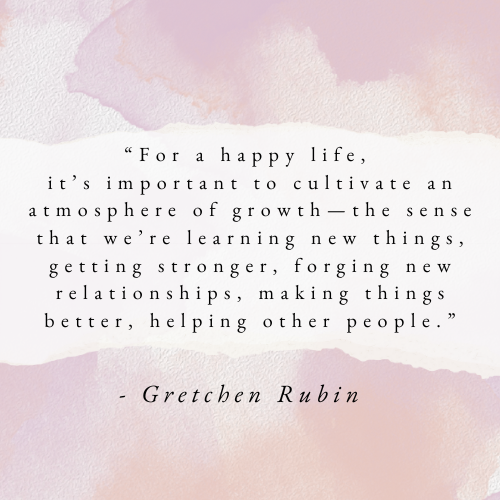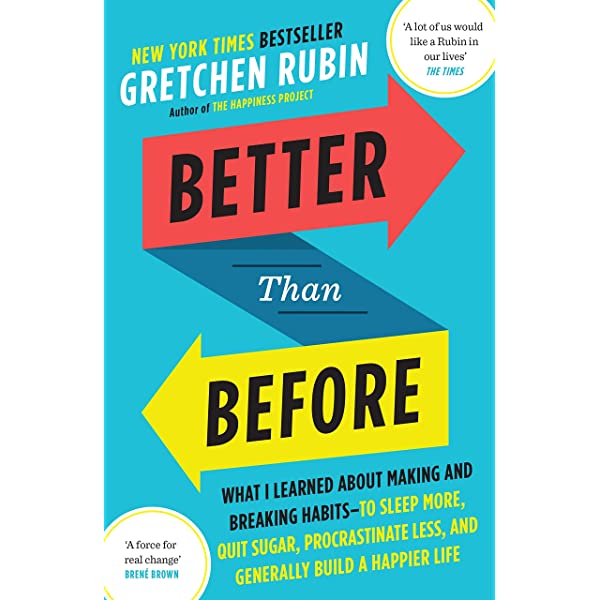Words of Wisdom from Better Than Before: Mastering the Habits of Our Everyday Lives by Gretchen Rubin

In Better Than Before: Mastering the Habits of Our Everyday Lives, Gretchen Rubin shares some fascinating insights on habit formation, based on research and studies, as well as her personal experience and experiments. As a busy working mum, I personally found many of Gretchen’s observations and strategies practical and achievable. Rather than focusing on discipline and rigid routines, Gretchen approaches the subject of habit change with grace and compassion, demonstrating that even the smallest first step can lead to great things.
1. We often feel happy when we’re growing, and healthy habits can help us to grow.
“For a happy life, it’s important to cultivate an atmosphere of growth—the sense that we’re learning new things, getting stronger, forging new relationships, making things better, helping other people. Habits have a tremendous role to play in creating an atmosphere of growth, because they help us make consistent, reliable progress.”
2. Choose your words carefully. They frame everything you do.
“The very words we choose to characterize our habits can make them seem more or less appealing. “Engagement time sounds more interesting than than “email time”; “playing the piano” sounds more fun than “practicing the piano”.
3. Just take the first small step.
“Each day gave me a new opportunity to push the task off until tomorrow. Tomorrow, I’d feel like dealing with it. “Start now,” I finally thought. “Just take the first step.” I started with the smallest possible step.”
4. There is a cost for good AND bad habits. The choice is yours.
“Keeping a good habit costs us: it may cost time, energy, and money, and it may mean forgoing pleasures and opportunities—but not keeping a good habit also has its cost. So which cost do we want to pay? What will make our lives happier in the long run?”
5. Habits help to relieve decision fatigue.
“Why do habits make it possible for people to change?” and now I knew the answer. Habits make change possible by freeing us from decision making and from using self-control.”
6. Don’t beat yourself up if you slip when trying to maintain a habit. Show yourself some compassion and then get back on your horse!
“Although some people assume that strong feelings of guilt or shame act as safeguards to help people stick to good habits, the opposite is true. People who feel less guilt and who show compassion toward themselves in the face of failure are better able to regain self-control, while people who feel deeply guilty and full of self-blame struggle more.”
7. Focus on the “big ticket” habits first.
“From my observation, habits in four areas do most to boost feelings of self-control, and in this way strengthen the Foundation of all our habits. We do well to begin by tackling the habits that help us to:
1. sleep 2. move 3. eat and drink right 4. unclutter”
8. Schedule time to maintain good habits.
“The Strategy of Scheduling, of setting a specific, regular time for an activity to recur, is one of the most familiar and powerful strategies of habit formation…When scheduling a new habit, it helps to tie it to an existing habit, such as “after breakfast,” or to an external cue, such as “when my alarm rings,” because without such a trigger, it’s easy to forget to do the new action.”
9. Outer order = inner calm.
“Also, there was a Princeton study that found that visual clutter reduces your ability to focus and process information.”
10. It takes longer than we think to establish a habit. Be patient and kind to yourself.
“Although many people believe that habits form in twenty-one days, when researchers at University College London examined how long people took to adopt a daily habit, such as drinking water or doing sit-ups, they found that, on average, a habit took sixty-six days to form.”

